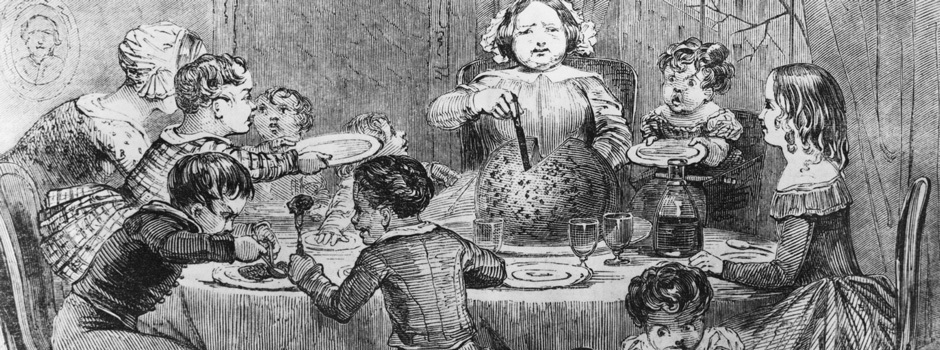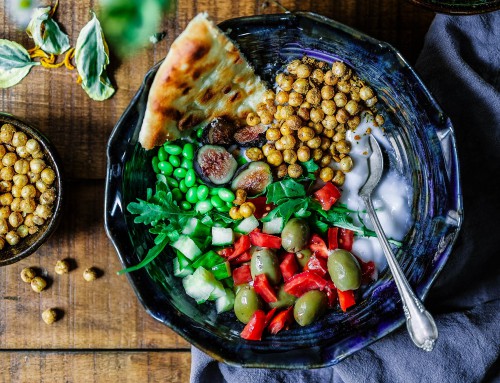
Ayurveda says our main meal should be at midday and our evening meal should be light. This is because our digestion is naturally high in the middle of the day and slows down, in preparation for sleep, during the evening.
So why have we changed our mealtime practices and what consequences does this have?
Dinner is posh, Tea is not
I was born on Cumbria, in the north of England, and spent most of my early years in Fife, Scotland. In both places we called our morning meal Breakfast, our midday meal Dinner and our evening meal Tea.
When I was ten we moved to Wiltshire in the South of England, and there I started coming across the term Lunch. Some of my newly acquired friends, and it tended to be the posh ones, would say, “I’m off for lunch”, when they were actually going for their dinners. Also they would say things like, “my mum will kill me if I don’t get home for dinner”, when they were actually referring to their tea.
At the time I thought that this was just some strange peculiarity of these soft Southerners, but later I realized that it was more of a class thing. I just asked my partner, who was born into a working-class Wiltshire family, and she, like me, also called her mealtimes breakfast, dinner and tea. It was later, when she went to a ‘good school’ and then onto University, that she came across the notion of breakfast, lunch and dinner.
Both of us have noticed that these ‘posh’ mealtime terms have become the norm over the last few decades – after all, we’re all middleclass these days.
Does not a rose by any other name…?
Does changing the name of a meal really make a difference to the way we eat? Well it seems it does, in that the name still indicates the quantity of food we eat as well as its content. Instead of our main meal, which supplies us with our main daily nutritional quota, being at midday, for most of us that meal (or dinner) is now in the evening.
Lunch is often a minor meal, which we manage to squeeze into the middle of the day.
Breakfast is the only meal whose name has not changed over time. Though what we eat for breakfast can vary considerably from person to person.
Eating on the job
The last two centuries have seen large changes in our work locations. Few of us now live close enough to our workplace that we can come home for a good midday meal (and, as our partner may be also out at work, there may be no-one at home to cook it for us anyway). Also, in many places of work, that midday break is so short there is little time for anything really substantial.
Hang on though. As long as you are getting your veggies, carbs, oils and proteins why does it matter when you have your main meal?
According to Ayurveda it matters a lot.
Time for your food
For about 12 years I taught at Exeter College in Devon. Some years before getting this job I developed the Ayurvedic habit of eating my main meal in the middle of the day. What re-enforced this habit was that it helped me sleep better and feel more rested in the morning.
This Ayurvedic eating routine makes prefect sense. If you eat a large, rich meal soon before bed, you’ll end up doing a lot of processing of food during the night. If, for most of the night, your body is busy processing food, how much processing power will be left to process mental and emotional information and stress gathered during the day?
My very own takeaway meal
My college schedule usually meant only 30 minutes for lunch. So, the night before, I would place cut veggies into a pan, add lentils, some tamarind (for the sour taste), dried fruit (for sweet taste), spices (for bitter, pungent and astringent tastes) and salt. I would then add water and leave the pan in the fridge over-night.
In the morning I would put the pan on to slow cook while I brushed my teeth, showered, meditated, put on my work cloths and had breakfast. I would then make some toast, put the cooked curry stew into a food flask, put the flask, toast and some cheese into my workbag and off I’d go to work.
My work colleagues were always amazed at my ability to eat a cooked lunch every day. The most organized among them brought sandwiches, which they or their partners had made. Others ran out to the local supermarket to get whatever snacks they could find.
How to put on weight eating hardly anything (during the day)
Andy was a colleague who started his Exeter College job on the same day as I did. He had a weight problem. Although he swore he never ate breakfast, and I could see he had very little for lunch, in the 12 years I knew him he became more and more plump.
During the same period I gradually lost weight and Andy just could not understand it.
Before working at the college I had a fairly sedentary job, sitting in front of a computer and designing brochures and magazines all day. As a result, over a period of 6 years, I gained a fair amount of weight. Occasional tea and biscuit breaks and having a Pitta/Kapha constitution did not help.
There was little opportunity to sit down in the new teaching job, as most of each lesson involved going from student to student and helping them learn IT. There was also little time for tea and biscuit breaks.
I lost over 3 stone during those twelve years of teaching. Yet despite his having the same active job I had, Andy kept complaining that he was gaining weight.
What made the difference between my weight loss and his weight gain?
It was not the amount we ate. I’m sure I ate as much if not more than him each day. I had breakfast every morning – he did not. I had quite a full lunch – he ate very little during the day. We also both had a Pitta/Kapha body-type.
Bigger evening meal = Bigger you
I’m certain that the main key to Andy’s weight gain was his evening meal.
Each evening I had a light meal – just toast and a veg and lentil soup. Andy’s wife was a great cook and she always had a sumptuous meal ready when he came home. Since he often worked late his ‘dinner’ would often start after 9pm. This meant only 1 to 2 hours to digest a heavy meal before he went to bed.
It’s little wonder that Andy never felt like breakfast and had little appetite for lunch. From an Ayurvedic point of view his eating routine was way out of whack.
Elemental dear Watson
Ayurveda talks about how there is daily cycle through the Doshas, the three basic elements of Kapha, Pitta and Vata, that make up the material universe.
The Doshas control all the elements of our body:
- Kapha, the heavy, cold, earthy Dosha, is responsible for the structure and strength of our body.
- Pitta, the hot Dosha, is responsible for transformation and digestion.
- Vata, the moving Dosha, controls blood flow, elimination of wastes, breathing and the movement of thoughts around the mind.
Cycling through a Dosha day
Different Doshas are also to be found to be more dominant at different times of the day.
Early morning, from 6-10am, is Kapha time. As Kapha is heavy and slow it is recommended to get up early before 6am. If you sleep in late you’ll find that Kapha heaviness will increase in your body. It’s best to eat a light breakfast, as your metabolism will be naturally slower during Kapha time. Those who have a Kapha body-type are often even recommended to skip breakfast and they usually have little appetite for it anyway.
10am-2pm is Pitta time. The sun (external fire) is at its highest in the sky around noon and your Agni (internal digestive fire) will correspondingly be at its highest. This is the best time to eat the heaviest meal of the day. Proteins and oils, which we need for energy and to replenish our tissues, are easier to digest if your Agni is high.
2pm-6pm is dominated by Vata Dosha. Vata is the light, moving, expansive Dosha. The need for movement and the conceiving of large ideas is often present when Vata predominates. For good digestion Ayurveda recommends a short walk after lunch and this will also satisfy the Vata need for movement.
6pm-10pm is Kapha time again and your body will gradually slows down ready for sleep. If you eat a heavy meal at this time it is very likely to sit in your digestive tract all night and create a good deal of toxic waste (called Ama). As a result you may wake up feeling dull, weak, unrested, rather achy and with a sour taste in your mouth – all signs of accumulated Ama. And Ama is the soil in which all diseases sprout.
Digest or detox – the choice is yours
When you sleep, your metabolism slows down. The deep rest that sleep offers allows your body the chance to detoxify and your mind to remove stress. If you give your body the added task of digesting a heavy meal during the night, the processing power or Agni, that it needs to detoxify the body and remove stress, will be diverted to deal with digesting that food. You’ll end up feeling you’ve had an unsatisfying night’s sleep and those stresses and toxins will not be dealt with properly.
The big lesson for Andy
Andy always felt that it was unfair that he ate so little during the day but still gained weight. I pointed out to him that his daily cycle was wrong and he was eating his main meal at the wrong time of day – in the evening. At that time of day his body is not in the right metabolic state to cope with so much food and so it stored that food up as fat and toxic.
Ama – partially digested food – is usually also produced when you eat a large meal late at night. Andy suffered from frequent colds and flu – typical signs of a build up of toxic Ama.
Andy would listen and nod when I tried explaining these concepts to him, but somehow it never quite got through. He so loved his wife’s cooking and he loved eating with her when he got home. So over the years Andy became bigger and bigger.
You can take an IT teacher to a bowl of veg and lentil soup, but you can’t make him drink it.
One thing I’m certain of though – when our society learns to drop breakfast, lunch and dinner and return to breakfast, dinner and tea, we’ll see a huge shift towards better health.
Treatments that will help
Panchakarma at Maharishi Ayurveda Health Centre
Panchakarma detox treatments from Maharishi Ayurveda Health Center are powerful Ayurvedic systems for removing accumulated Ama that results from improper eating. Detox Panchakarma breaks help get you back on the track of good daily routine, a balanced diet and good health.
Herbal recommendations
Despite your best efforts to be good and eat the right amount at the right time, sometimes you might find yourself overeating in the evening, especially if you go out with friends. Triphala Rose helps the body detox Ama and clean out any accumulated waste in the body. In this way it improves the whole digestive process.
Digest Plus and Digest Plus Tea
Digest Plus and Digest Plus Tea are highly recommended after a heavy meal as they stimulate Agni (digestive fire) and speeds up your metabolism. They also help when you have sluggish bowels, feel dull, tired, or bloated after eating, or feel that your digestion is low.
Trikatu with Clove is very useful if don’t have an appetite for your next meal. It contains three strongly pungent spices – ginger, black pepper and long pepper –that stimulate the digestion juices. They help your body digest any previously undigested food from the previous meal and help it to stimulate your Agni ready for the next meal.
Trikatu with Clove is also suitable to take straight after a heavy meal to aid metabolism.





